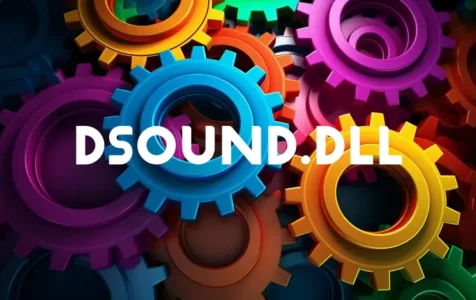DSOUND.DLL is a dynamic link library file associated with Microsoft’s DirectX suite, which is utilized by a multitude of multimedia applications and games on Windows operating systems. Specifically, DSOUND.DLL relates to DirectSound, which is a feature that handles the playback of sound effects and music in software applications. As one of the components of DirectX technology, DSOUND.DLL is essential for programs that need to process audio using the DirectX framework.
Is DSOUND.DLL Safe to Run?
In its original, unaltered state, DSOUND.DLL is safe to run and is a legitimate file provided by Microsoft as part of the Windows operating system. However, it’s always wise to ensure that the file is genuine and has not been tampered with or replaced by a similar-looking malicious file.
Could DSOUND.DLL Be a Virus or Malware?
Malware can sometimes disguise itself as legitimate DLL files like DSOUND.DLL. If you suspect that the file may not be legitimate, or if you are experiencing unexpected errors related to DSOUND.DLL, it could indicate the presence of malware. It’s advisable to run a scan with a reputable antivirus or anti-malware program to rule out the possibility of infection.
Common Issues Associated with DSOUND.DLL
Users might encounter various issues with DSOUND.DLL, such as errors stating that the file is missing, has been deleted, is misplaced, or corrupted. These errors can prevent applications and games from running correctly. Other issues might include problems with the Windows registry, conflicts with software installations, or outdated Windows versions.
Expert Tip: For smoother PC performance, consider using a PC optimization tool. It handles junk files, incorrect settings, and harmful apps. Make sure it's right for your system, and always check the EULA and Privacy Policy.
Special offer. About Outbyte, uninstall instructions, EULA, Privacy Policy.
How to Fix Issues with DSOUND.DLL
If you’re experiencing problems with DSOUND.DLL, here’s a series of troubleshooting steps you can follow to resolve the issues:
1. Re-register DSOUND.DLL: Sometimes, simply re-registering the DLL file can correct errors. You can do this by typing `regsvr32 C:\Windows\System32\dsound.dll` in a command prompt running with administrator privileges.
2. Run System File Checker (SFC): This built-in Windows tool can check for and replace corrupted system files, including DLL files. You can run SFC by typing `sfc /scannow` in an elevated command prompt.
3. Install the Latest Version of DirectX: Because DSOUND.DLL is part of DirectX, updating or re-installing DirectX might resolve the issue.
4. Scan for Malware: Use a trustworthy antivirus program to scan for and remove malware from your system.
5. Use DISM Tool: The Deployment Image Service and Management Tool (DISM) can help fix Windows corruption errors when SFC is unable to fix the problem.
6. Check for Windows Updates: Updating Windows can solve compatibility issues and replace missing files.
7. Create a New User Account: Sometimes, creating a new user account can fix problems associated with a corrupted user profile.
8. Manually Copy the File: If you have another working PC with the same version of Windows, you can try copying the DSOUND.DLL file from that computer to yours.
9. Steam Community and Reddit Discussions: For game-specific issues, consider searching for existing discussions on platforms like Steam or Reddit where users share solutions for similar problems.
Using DSOUND.DLL Download Sites
While there are websites offering different versions of DSOUND.DLL for download, caution is advised. Downloading DLLs from unofficial sources can pose security risks. If you do need to download a fresh version of the DSOUND.DLL file, it’s best to obtain it from the official Microsoft website or through updating DirectX.
Dynamic Link Libraries Similar to DSOUND.DLL
If you come across other DLL files and wonder about their authenticity, know that DSOUND.DLL is one among many libraries crucial for Windows functionality, just like Msvcr120.dll, Kernel32.dll, and Isdone.dll. These files enable various functionalities within the operating system and should also be treated with caution, ensuring they remain in good standing and uncorrupted to avoid system issues.
Remember, tinkering with system files can be risky, so it’s advised to proceed with caution and back up important data before making any changes to your system files. If you’re not comfortable performing these actions, seek assistance from someone with more technical expertise.
